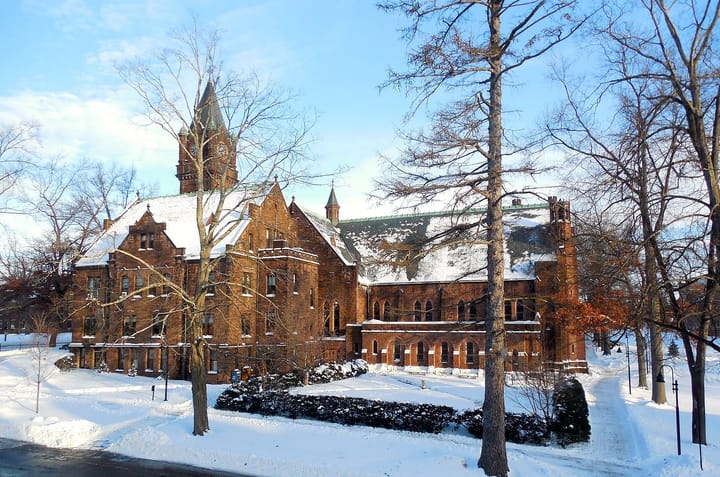Amherst Alum Wins MacArthur “Genius Grant” Fellowship
The MacArthur Foundation awarded the MacArthur “Genius Grant” Fellowship to Andrea Dutton ’95, a geochemist and paleoclimatologist studying past sea level rises to predict its future conditions, on Sept. 25. The grant is a no-strings-attached sum of $625,000, installed in quarterly payments over a five-year period. Dutton is the seventh Amherst alum to win the prestigious award. She plans to use the grant to further her research, aid women in science and spend more time with her family.
Dutton’s findings on sea level change during earlier periods of global warming, at similar levels to today, reveal the fragility of the ice sheets found in Greenland and Antarctica. Her research highlights the necessity to mitigate current global warming and its dangerous effects.
Dutton followed a nontraditional path to her current occupation. When arriving at Amherst in the fall of 1991, Dutton had planned to fulfill the pre-med requirements, take the MCAT and attend medical school while majoring in music. It wasn’t until her sophomore year that she took her first geology course.
“I was leaning toward being a chemistry major,” Dutton said in an interview with The Student. “Someone recommended that I take linear algebra because it would help me in [physical chemistry]. On the last day of the add-drop period, we got back our first homework assignment. We had to write a proof for 1 + 0 = 1, and I got it wrong. I couldn’t believe it! So I dropped the class, asked around and my friends told me to take Intro to Geology. I fell in love with it.”
Chair of Geology Tekla Harms, whom Dutton considered her advisor even though she never declared geology as her major, said she knew Dutton was special and helped push her toward taking geology courses. “Geology was clearly something she liked and thought about,” Harms said. “Not all people end up feeling that way … There are very few people who come to college thinking they’re going to do geology. Sometimes that takes a conversation that says, ‘I can see you doing this, can you see yourself doing this?’”
“I was not the only faculty member who tried to push her into the geology major full on. She was clearly so innately adept at thinking about geology. If you love the field as much as I love geology, you want the best people to be in that field … We leaned on her pretty hard, but she was strong-willed and resisted those pushes to become a geology major … Not to her detriment as you can see,” Harms added with a laugh.
It wasn’t immediately clear to Dutton’s professors which career path, or major, she would choose. In fact, Dutton’s first academic advisor upon arriving to Amherst, Professor of Chemistry Mark Marshall, and her geology professor, Professor of Mineralogy and Geology John “Jack” Cheney, made a bet on what major Dutton would choose — chemistry or geology. To the astonishment of both, Dutton majored in neither, instead choosing to take some geology classes while continuing to major in music.
“Andrea’s older sister was a chemistry major, so I knew the family,” Marshall said. “In the end, she surprised us both.”
“I tell all of my advisees about her to this day. I say, ‘Look, you don’t have to major in whatever you’re going to be spending the rest of your life doing,’” Marshall added. “My recollection is that Andrea said she loved music … and she wanted to spend her time doing what she loved, music, … while taking advantage of Amherst’s curriculum.”
“I think Jack won the bet,” Marshall said, laughing.
Dutton took as many geology classes as she could while majoring in music. “That ended up being five courses, I believe,” she said. “When I graduated, like a typical nerd, instead of asking for a traditional graduation present, I asked my parents to fund a geological field trip.”
She continued her nontraditional science career path after graduation, teaching science classes at Saint Ann’s School, a private K-12 school located in Brooklyn.
“All the jobs I had in my life to that point were some sort of teaching — whether that was being a coach, or something like that,” she said. “I taught at St. Ann’s for a couple of years while I figured out what I wanted to do with my life.”
It was at St. Ann’s that Dutton realized she wanted to pursue a further education in geology — in her own words, she wanted to “scratch that itch.”
Dutton turned to her support network at Amherst for advice. Her professors, including Harms, encouraged her to apply for graduate school.
“When I have those types of conversations with students, I say do it!” Harms said. “Our country values education; it’s seen as a strategic advantage. They will pay you to go to graduate school in geology.”
Dutton listened, and received her master’s and doctoral degrees from the University of Michigan in 2000 and 2003, respectively. In 2004, Dutton traveled to Australia to work as a postdoctoral fellow. During her time in Australia, Dutton found her niche in the geological field studying sea level rise, for which the MacArthur Foundation awarded her the grant.
“It was in part because it was the only position available for me,” Dutton said. “As a postdoc, you kind of take what you get. But I was always drawn to researching questions that have an immediate impact on society, rather than things that are intellectually stimulating but less relevant.”
Dutton uses fossilized coral found near the surface of the ocean to track sea level changes over time. Using data from the location and elevation of the geological outcrop, coupled with radiometric dating techniques, she reconstructs the sea level throughout history.
Dutton’s research has seen breakthrough results that can shift perspectives on global warming. “We’ve found during past warm periods, the polar ice sheets in Greenland and Antarctica are very sensitive to small amounts of global average temperature warming,” she said. “When people hear these small numbers, they say, ‘Oh, we’re worried about two degrees Celsius global warming?’ It sounds very small. In fact, during the last ice age, 20,000 years ago, when we had ice sheets a mile thick over North America, it was only four degrees warmer, on average globally.”
Dutton’s career, Harms said, and the “rigor with which she does her science” are widely respected. “I don’t sit in my office and say, ‘I’m in the presence of a future MacArthur Fellow,’ … but I can’t say, now, that I am at all surprised [that Dutton received the grant],” Harms said.
As a single mother of two children who frequently travels to far off places for field work and conferences around the world, Dutton says she has been trying to “keep [her] head above water, no pun intended.”
What Dutton does know is that one portion of the fellowship will finance familial matters — the other will go to her work.
“Having those finances, I will use at least some of it,” she pauses, as one of her children walks into the room to ask a question. “Being a single mother has some financial burdens: in terms of paying for babysitters every time you take a colleague out for a work dinner, it will certainly help with that, and also allow me to be more present for both my work and my family. That’s a huge benefit that I think will pay off enormously.”
Dutton also hopes to take some of the money and “pay it forward to the people coming up behind [her],” she said.
With increasing average global temperatures, the need to advance climate science is urgent. One way Dutton said she will lend a hand is to “help women in science navigate their careers … through scholarships, or something else, I’m not quite sure yet … I want to take my time to think outside the box, see what others have done and see what’s been the most effective.”
“My kids are excited, mostly about the money part,” Dutton added. “I set up a video conference with my family, and they were so proud. It was nice to be able to share that with them.”





Comments ()